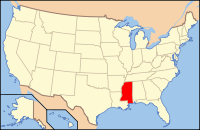Franklin County, MS
| Franklin County, Mississippi | |
|---|---|
 Location in the U.S. state of Mississippi |
|
 Mississippi's location in the U.S. |
|
| Founded | 1809 |
| Named for | Benjamin Franklin |
| Seat | Meadville |
| Largest town | Bude |
| Area | |
| • Total | 567 sq mi (1,469 km2) |
| • Land | 564 sq mi (1,461 km2) |
| • Water | 3.0 sq mi (8 km2), 0.5% |
| Population | |
| • (2010) | 8,118 |
| • Density | 14/sq mi (5/km²) |
| Congressional district | 3rd |
| Time zone | Central: UTC-6/-5 |
| Website | www |
Franklin County is a county located in the U.S. state of Mississippi. As of the 2010 census, the population was 8,118, making it the fourth-least populous county in Mississippi. Its county seat is Meadville. The county was formed on December 21, 1809 from portions of Adams County and named for Founding Father Benjamin Franklin. It is bisected by the Homochitto River, which runs diagonally through the county from northeast to southwest.
This was the fourth county organized in Mississippi. It was initially developed for agriculture, specifically cotton plantations based on enslaved labor of African Americans. Cotton continued to be important to the economy through the 19th century and into the early 20th century.
This still rural county has had a decline in population by about half since 1910. It is the fourth least populous county in the state. Mechanization of agriculture and the blight of the boll weevil both reduced the need for farm workers; they left the area and often the state. Many African Americans went north or west in the Great Migration before and after World War II. The county in the 21st century is majority white in population; in the 2000 census, African Americans composed more than 36% of the population. (See Demographics section below.)
As in the rest of the state, the county had racially segregated facilities under Jim Crow from the late 19th century. Many white residents opposed the civil rights movement of the mid-20th century. In May 1964, Ku Klux Klan members abducted and killed two young black men, Henry Hezekiah Dee and Charles Eddie Moore of Meadville, before Freedom Summer started. Their bodies were not discovered in the Mississippi River until July 1964, during the hunt for three disappeared civil rights workers.
...
Wikipedia
